Law firms work with diverse clients who all have unique requirements. That puts legal advisors in a delicate position — they have to deliver exceptional services while nurturing client relationships. More often than not, this turns out to be mission impossible without a client relationship management (CRM) tool.
There are a lot of CRM platforms though, so which one should you choose? In this blog post, we’ll discuss some of the best CRM for law firms that can assist you in building stronger connections with your clients.
But before we get to that, let’s answer a simple question.
What can legal CRM software do for you?

Law firms use legal CRM software to successfully manage client interactions and case-related information. This type of system is particularly useful for mid-sized and large legal practices working with many clients simultaneously. Though different CRM systems come with different features, some of those are universal:
- Client management: They keep a comprehensive database of clients — their contact details, case history, documents, and any relevant notes.
- Tracking communication: The system records an entire communication history with clients (emails, phone calls, meeting minutes, and other types of interactions).
- Document management: These platforms often include tools for document storage, retrieval, and management.
- Lead nurturing: The system goes beyond traditional case management to help your firm acquire new clients.
- Calendar and activity tracking: Your law firm could also use the CRM system for scheduling appointments and tracking activities from to-do lists.
- Billing: Most legal CRM platforms support client billing, which helps you keep track of time spent on cases and generate accurate invoices.
Related: 5 client onboarding best practices for making a lasting first impression
Do law firms need a CRM?
They absolutely do! Even a small law practice with a limited number of clients could use a CRM system to optimize internal processes and streamline communication.
It’s an easy way to adopt a more client-centric approach in the legal industry. For example, it allows you to harness client data for personalized service as well as targeted interactions. As such, a good CRM solution gives you a competitive advantage over less agile firms.
When does CRM become an overkill?
Law firms don’t need a dedicated CRM tool if its complexity outweighs the benefits it provides.
For instance, this might happen if your firm has a very small client base or primarily deals with relatively simple cases. CRM can also become more of a burden than a tool for efficiency if your team lacks the resources or commitment to properly implement and maintain it.
If this sounds a lot like your law firm, perhaps you’ll be better off without it. But if you still want to try and see how it works, we recommend starting with a simple and free solution such as HubSpot.
Related: How to create the perfect law firm client intake form
The best legal CRM software
We tested more than 20 CRM systems to analyze their key features and pricing plans. We also read hundreds of user reviews on Capterra and G2 to see what long-time clients have to say about all those platforms. The list below is the result of our research.
1. Law Ruler: Best overall
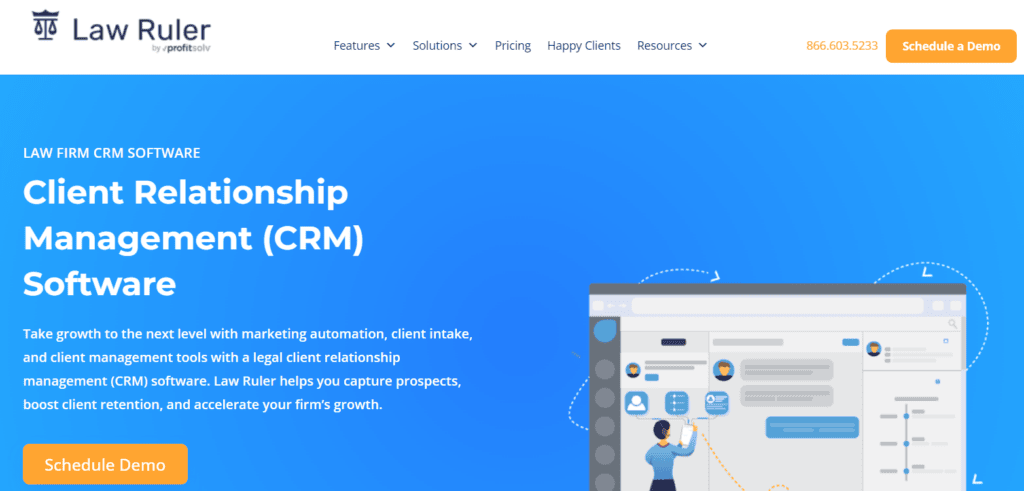
- Strengths: A comprehensive list of CRM features designed specifically for law firms
- Weaknesses: Pricing plans include lots of extra costs
- Pricing plans: Pro ($169 a month), Premium ($212), Enterprise (custom price)
Law Ruler is a case management and CRM software designed specifically for law firms and legal professionals. This platform gives you many ways to streamline everyday operations such as document tracking and intake management.
The thing we like the most is Law Ruler’s strong marketing focus. With this tool, it’s easy to capture leads through automated email and SMS campaigns. For example, you can use it to re-engage potential clients who once failed to convert.
On the downside, Law Ruler is pretty expensive, especially if you want to upgrade it or add more users to the system. This can be a serious limitation for smaller firms on a shoestring budget.
2. Zoho CRM

- Strengths: A truly extensive set of features
- Weaknesses: Limited legal-specific features and a pretty hefty price tag
- Pricing plans: Standard ($15 per user/month), Professional ($24), Enterprise ($41), Ultimate ($53)
Zoho CRM is a massive platform that covers all aspects of client management processes. Though it’s not a legal-specific tool, it features countless customization options that let you tailor internal procedures as needed.
This system works best as part of a bigger Zoho business suite, but it has enough third-party integration options to merge with other applications commonly used in legal practice. That way, you’ll be able to automate repetitive tasks and maximize productivity.
Zoho CRM also offers lead management tools and advanced reporting and analytics capabilities. Though the sheer range of options may seem frightening at first, larger law firms will quickly turn Zoho CRM to their advantage.
3. Flowlu: Best free tool
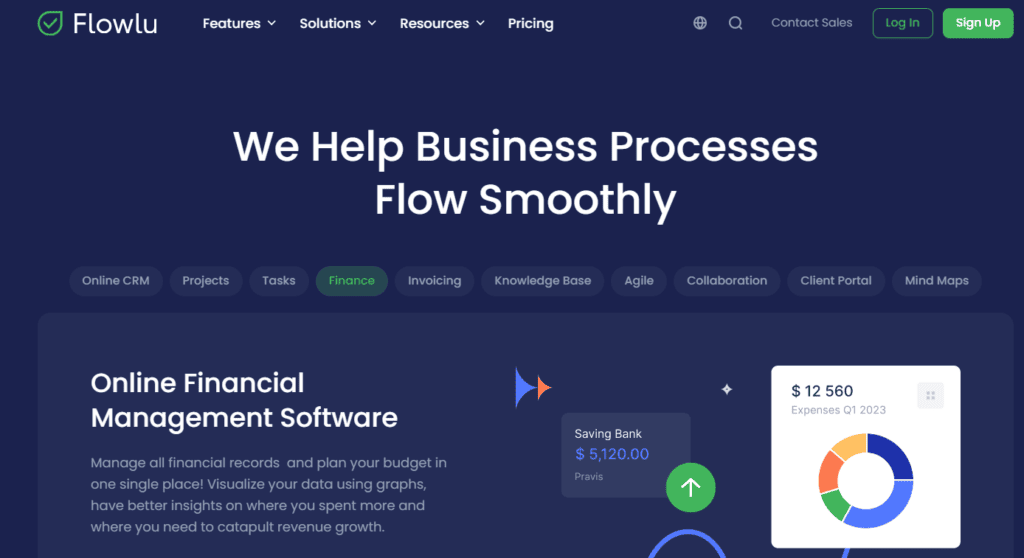
- Strengths: It’s free for up to 2 users
- Weaknesses: Not designed for law firms in particular
- Pricing plans: Free, Team ($29 a month), Business ($59), Professional ($119), Enterprise ($199)
Flowlu is business management software with tools for project management, CRM, task collaboration, and finance. It is designed to help teams manage multiple aspects of their operations in a unified platform. For instance, you can use it to track time, expenses, and invoices. Flowlu also offers a range of task management functionalities to help you coordinate different cases and team members.
On the other hand, this system is not made for law firms interested in advanced features such as custom reports or document automation. But if you’re a solopreneur or running a small team of legal professionals, Flowlu’s free version will probably do the trick.
4. HubSpot CRM: Best for small firms
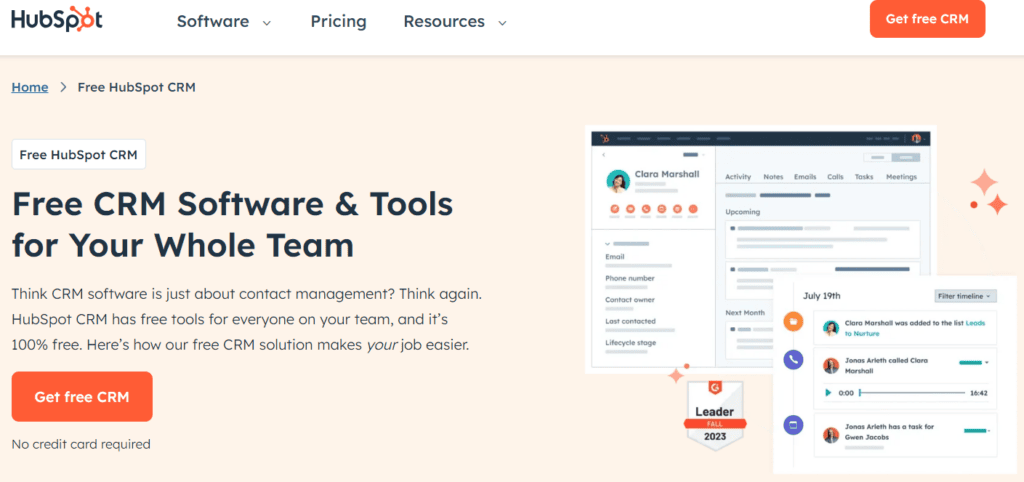
- Strengths: Amazing lead generation features
- Weaknesses: A steep learning curve
- Pricing plans: Free, CRM Suite Starter ($20 a month), Professional ($370), Enterprise ($1,200)
HubSpot CRM is an excellent solution for small-sized law firms looking for a user-friendly platform to streamline internal processes. This tool enables you to efficiently organize client information, track communications, and manage leads.
The best thing is that the platform’s scalability allows firms to adapt as they grow. For instance, you can start with a highly affordable CRM Suite Starter plan and switch to the more expensive package as soon as your practice grows bigger.
However, HubSpot CRM serves a broad range of businesses. This makes the system pretty complex, so many legal professionals may find the learning curve to be a bit too steep.
5. Clio: Best for large firms
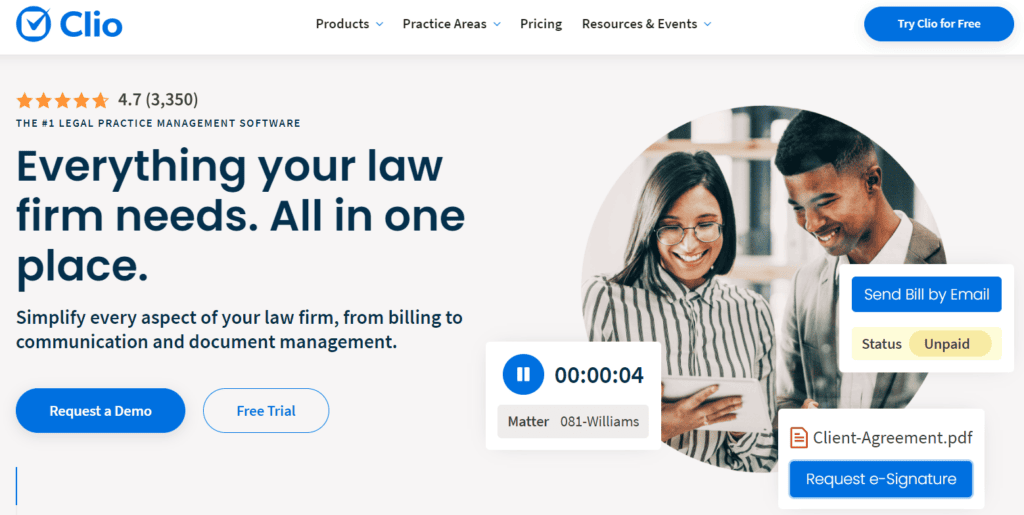
- Strengths: An all-encompassing feature set
- Weaknesses: It’s a bit too dependent on email communication
- Pricing plans: Easy Start ($39 a month), Essentials ($69), Advanced ($99), Complete ($129)
Clio stands out as a comprehensive solution tailored specifically for law firms. The strengths of this system lie in its robust case management, document automation, advertising, and time-tracking capabilities that can help you handle all client-related matters.
Clio’s case management system is superior — it displays everything you need to know about your cases on a centralized dashboard, including files, event notifications, bills, special notes, contact details, and so on.
But this CRM software isn’t perfect. Apart from being complex, Clio still heavily relies on email communication. There’s a way to override this through third-party integrations, but many user reviews say it’s a time-consuming process.
Bonus tip: Streamline your CRM efforts with Content Snare
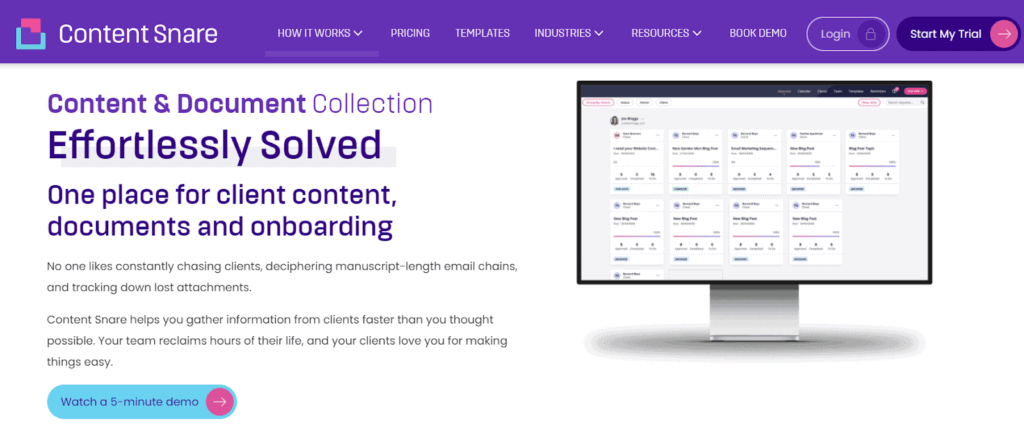
Investing in the right CRM tool should be a strategic imperative for law firms striving to balance legal prowess with client relationships. But in order to achieve this, you’ll need another system to streamline the client intake process.
That’s where Content Snare steps in.
Our platform sets the stage for CRM software by helping you gather the right information and files from new clients on time. It’s easy to do this with our ready-made law firm client intake form. You can send it as-is, or tailor it to create a more personalized experience.

Content Snare assists you with progressive profiling too. As you keep getting additional information about your clients over time, you can automatically transfer those updates to the CRM tool. This will help you build successful client relationships in the long run.
Unlike CRM platforms, Content Snare has a customizable reminder schedule that automatically notifies clients to send you the required information. You can also add instructions to each field in the intake form, while your clients can post comments or ask for additional explanations.
Such features turn Content Snare into a single source of truth for all client-related information and files. But that’s just a speck of what this tool can do, so we encourage you to take a 14-day free trial and figure out the benefits.



